Thinking about moving to Ethiopia or planning an extended stay? Understanding the cost of living is crucial. Ethiopia is known for its rich culture and history, but what's it like living there day-to-day?
In this article, we'll explore different aspects of daily life in Ethiopia, focusing on how much money you need to live comfortably. From housing and groceries to transportation and entertainment, we've got you covered. With practical tips and interesting facts, we'll help you budget effectively and make the most of your experience in this fascinating country.
- Housing Costs
- Food and Groceries
- Transportation Expenses
- Healthcare and Insurance
- Entertainment and Leisure
- Tips for Managing Your Budget
Housing Costs
Ethiopia offers a variety of housing options, ranging from modern apartments in bustling cities to traditional homes in rural areas. The capital city, Addis Ababa, typically has the highest housing costs in the country. Renting a one-bedroom apartment in the city center can range from $250 to $600 per month, depending on the neighborhood and the amenities included. Outside the city center, prices can drop to around $150 to $300 per month for a similar apartment.
If you're looking to rent a larger home or villa, expect to pay upwards of $1,000 per month, especially in neighborhoods like Bole or Old Airport, which are popular among expatriates. Furnished rentals are also available, but they tend to be more expensive. For those on a tighter budget, sharing an apartment with roommates can be a cost-effective way to lower monthly expenses.
Utility costs such as electricity, water, and internet are usually not included in the rental price, so it's important to budget for these additional expenses. On average, monthly utility bills for a small apartment can range from $30 to $60. Internet and mobile phone plans are affordable, with prices around $20 to $40 per month for a decent internet package.
In rural areas or smaller towns, housing costs are significantly lower. Renting a traditional house or a modest apartment can cost as little as $50 to $100 per month. However, keep in mind that amenities and comfort levels might not be up to the same standard as in major cities. But, if you're seeking an authentic Ethiopian experience, rural living can be incredibly rewarding.
Purchasing property in Ethiopia is also an option for those looking to make a long-term investment. The real estate market in Ethiopia is still developing, with new apartment complexes and residential projects emerging, especially in Addis Ababa. Prices can vary widely based on location, size, and quality of construction. For example, a newly built apartment in the city center might cost anywhere between $50,000 to $150,000.
According to a study by the Global Property Guide, "Real estate prices in Ethiopia have been rising in recent years due to increased demand and economic growth."Buying property requires navigating the legal system and understanding local regulations, so it's advisable to work with a reputable real estate agent and legal counsel.
For those planning to rent, it's a good idea to visit potential properties in person and, if possible, negotiate with landlords. While rental contracts are typically straightforward, they vary in terms of lease duration, deposit requirements, and other conditions. Always read the fine print and understand your obligations before signing a lease agreement.
Food and Groceries
In Ethiopia, food is not just sustenance; it's a pillar of culture and tradition. Most of the country enjoys a diet that includes injera, a spongy flatbread made from teff flour, and various stews known as wats. If you're buying groceries, understanding the local market can help you stretch your budget effectively.
Local Markets vs Supermarkets
Shopping at local markets is by far the most economical way to buy food. Fresh vegetables, fruits, and spices are abundant and affordable. In contrast, supermarkets offer imported goods but at a higher price. For instance, a kilogram of local organic tomatoes can cost as little as 10 ETB (about $0.20 USD), whereas the same amount in a supermarket might set you back 40 ETB (approximately $0.80 USD).
It's fascinating to witness how local markets function. You might find sellers, called 'suks' in Amharic, displaying heaps of fresh produce on large tarps. Many engage in bartering, which can be both an adventure and a way to practice your negotiation skills. Supermarkets, found predominantly in urban areas, provide a more familiar shopping experience but at Western prices.
"Food is central to the Ethiopian way of life. Sharing meals is an act of community and friendship," says Dr. Mesfin Abebe, a cultural anthropologist at Addis Ababa University.
Cost Breakdown
Here's a rough breakdown of what you can expect to spend on groceries per month:
- A week's worth of fresh vegetables and fruits for one person: 150-200 ETB ($3-4 USD)
- 1 kilogram of teff flour: 50 ETB (around $1 USD)
- 1 liter of milk: 20 ETB ($0.40 USD)
- 500 grams of locally produced cheese: 100 ETB ($2 USD)
- 1 liter of cooking oil: 50 ETB (around $1 USD)
If you're cooking meals at home, expect to spend anywhere from 800 to 1,500 ETB ($16-30 USD) per month on groceries. This doesn't account for dining out, which is quite affordable as well. A meal at a modest local restaurant might cost you just 50 ETB ($1 USD), while dining at a more upscale restaurant could run you about 200 ETB ($4 USD).
Specialty Items
Finding specialty items like gluten-free foods or specific foreign brands can be challenging and expensive. If you have dietary restrictions, your best bet is to check international supermarkets, but be prepared for sticker shock. For instance, a loaf of gluten-free bread imported from Europe might cost 200 ETB ($4 USD) compared to 20 ETB ($0.40 USD) for a local loaf.
Ultimately, living in Ethiopia offers the chance to indulge in fresh, local produce at very affordable prices. If you stick to locally sourced foods, you'll not only save money but also experience the rich culinary culture that makes Ethiopia unique.
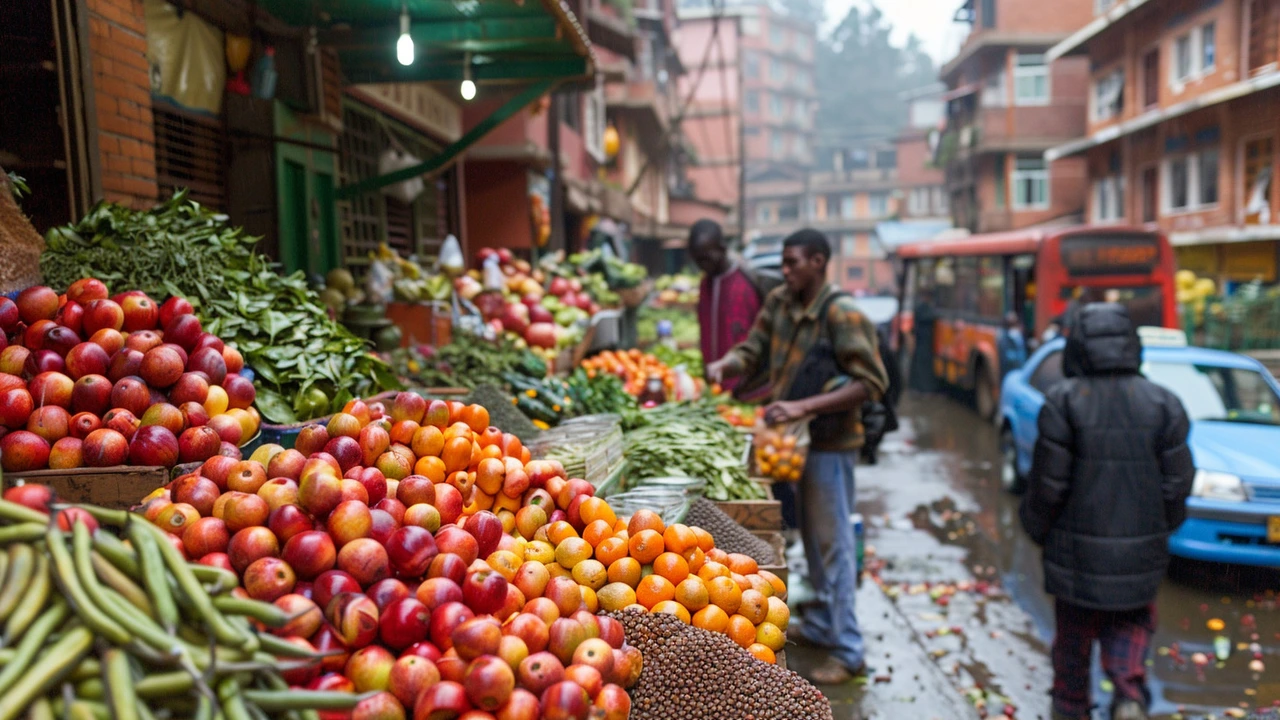
Transportation Expenses
Getting around Ethiopia is a blend of modern convenience and traditional charm. Ethiopia's transportation network is diverse, ranging from public buses to private cars. Understanding the costs can help you budget wisely.
Public transportation is the most common way to travel within cities. The blue and white minibusses, locally known as 'matatus,' are a popular choice. A typical ride within major cities like Addis Ababa costs around 5 to 10 ETB (Ethiopian Birr), making it an affordable option. For longer distances, prices can go up to 20 ETB. These minibusses are not only cheap but also frequent, ensuring you won't have to wait long for a ride.
If you're looking for a more comfortable and faster mode of transportation, taxis are widely available. There are two types of taxis: shared (yellow) and private (blue). Shared taxis operate like minibusses, picking up multiple passengers headed in the same direction. The cost per ride ranges from 15 to 30 ETB depending on the distance. On the other hand, private taxis can be more expensive, ranging from 100 to 200 ETB per trip within the city. It's advisable to negotiate the fare before starting your journey.
For those who prefer driving themselves, car rental services are available, though they can be pricy. Renting a small car for a day can cost around 1,500 to 2,000 ETB, excluding fuel. Gasoline prices are relatively high, fluctuating around 25 to 30 ETB per liter. Keep in mind that traffic in cities can be chaotic, and parking can sometimes be challenging.
According to the Ethiopian Ministry of Transport, the country is investing heavily in improving its transportation infrastructure. The Light Rail Transit (LRT) system in Addis Ababa is a milestone, offering a modern and efficient alternative for daily commuters.
Speaking of the LRT, it's the first light rail system in Sub-Saharan Africa and a significant achievement for Ethiopia. The LRT has two lines, running from north to south and east to west, covering a total of 34 kilometers. An LRT ticket costs around 6 ETB, making it an affordable and speedy option, especially during peak hours.
For intercity travel, long-distance buses are the go-to option. Several companies offer services between major cities. A trip from Addis Ababa to Dire Dawa, for instance, costs about 400 to 500 ETB and takes around 10 hours. These buses are generally comfortable and provide a cost-effective way to explore different regions of the country.
Additionally, if you're considering air travel, Ethiopian Airlines offers domestic flights between major cities. While more expensive than ground transportation, flights can save you a significant amount of time. A one-way ticket from Addis Ababa to Gondar typically costs between 1,500 and 3,000 ETB, depending on the season and how far in advance you book.
In summary, Ethiopia offers various transportation options to fit different budgets and preferences. Whether you're on a shoestring budget or looking for comfort and convenience, there's something for everyone. Knowing the costs and options available will help you navigate your way through this fascinating country without breaking the bank.
Healthcare and Insurance
When considering a move to Ethiopia, understanding the healthcare system is essential. The country offers a mix of public and private healthcare services. Public hospitals and clinics are more affordable, but they can be crowded, and the quality of care may not be on par with private facilities. Private hospitals and clinics provide higher quality care but come with a higher price tag and are primarily located in major cities like Addis Ababa.
For expats and those planning to stay long-term, obtaining health insurance is highly recommended. International health insurance plans can offer coverage that includes access to private facilities and, sometimes, evacuation services. Local healthcare plans are also available and can be significantly cheaper but may not cover more severe health issues or treatments abroad.
One thing to note is that while healthcare in urban areas is improving, rural regions still face challenges. Access to medical facilities in remote areas is limited, and the quality of care can vary significantly. Thus, living in or near a city can be crucial for those who may require frequent medical attention.
"Investing in health insurance can be a lifesaver, especially in a country where medical facilities may be inconsistent in quality," says Dr. Helen Mamo, a healthcare consultant based in Addis Ababa.
Vaccinations are another critical area to pay attention to. Common vaccines, such as those for yellow fever, malaria, and hepatitis, are necessary. It's advisable to consult a healthcare professional before making the move to ensure you're up-to-date on all required immunizations.
For those who are into holistic and traditional medicine, Ethiopia offers a range of alternative treatments. Herbal remedies and therapies are widely practiced, and you can find shops selling herbal medicines and natural treatments. However, it's crucial to consult with healthcare professionals to avoid complications or negative interactions with prescribed medications.
Another consideration is mental health. While the stigma around mental health issues is slowly diminishing, access to mental healthcare can still be limited. Some international organizations and private clinics offer counseling and psychiatric services. If mental health is a primary concern, make sure to research and identify available resources beforehand.
Cost of Medical Services
When it comes to the cost of healthcare, it's a mixed bag. Public healthcare is more affordable, sometimes even free for basic services, but for specialized care, you may need to turn to private healthcare facilities. An average visit to a general practitioner in a private clinic may cost you around $20-$50, while more specialized procedures can run into the hundreds or even thousands of dollars. Here is a rough breakdown of common costs:| Service | Public Hospital | Private Clinic |
|---|---|---|
| General consultation | $5-$10 | $20-$50 |
| Specialist consultation | $10-$20 | $50-$100 |
| Basic surgery | $200-$500 | $1,000-$3,000 |
Understanding these costs can help you budget effectively and make informed decisions about your healthcare needs in Ethiopia.
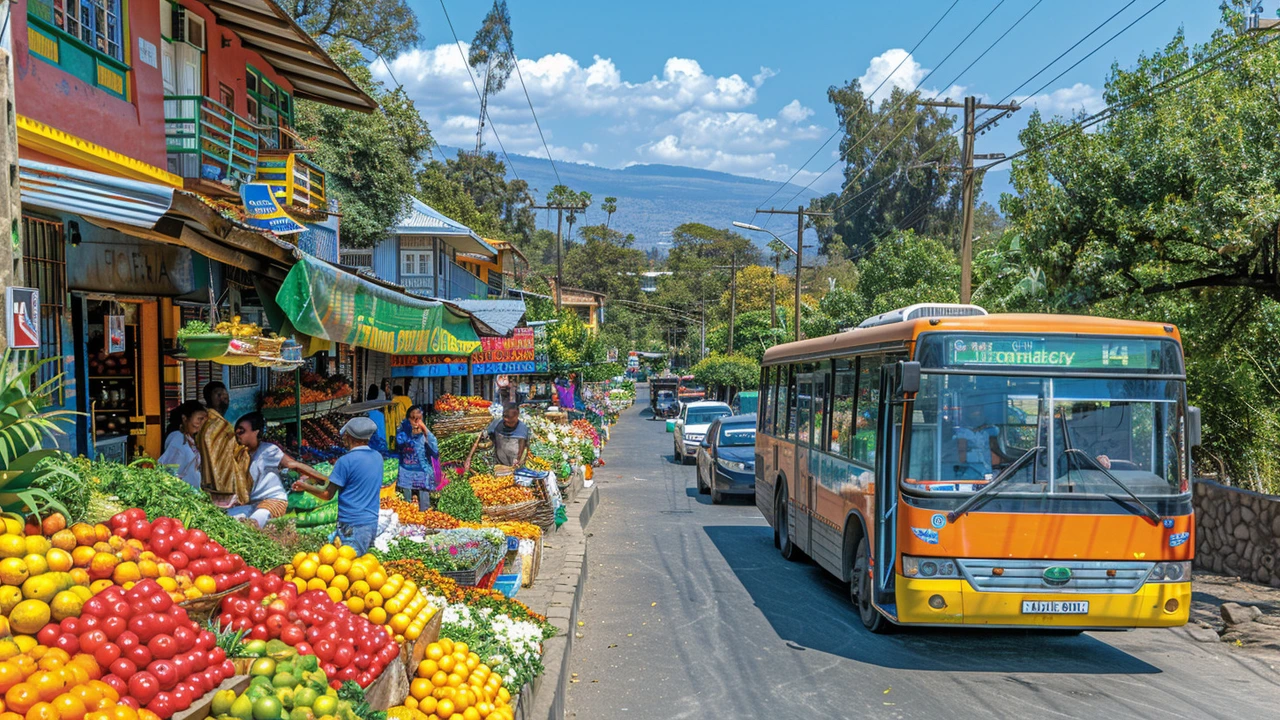
Entertainment and Leisure
When living in Ethiopia, you will discover that the country has a wealth of entertainment and leisure options that cater to various tastes and interests. One of the most exciting aspects of Ethiopian life is its vibrant music and dance scene. Traditional music featuring instruments like the krar, masenqo, and washint can be experienced at local venues and during cultural festivals. If you are a fan of modern genres, cities like Addis Ababa have an ever-growing scene with clubs playing Afrobeat, reggae, and more.
"Ethiopia's cultural landscape is rich and diverse, offering endless opportunities for both relaxation and adventure," says Selam Kebede, a local cultural expert.
Selecting a night out might involve visiting one of Addis Ababa's many theaters or cinemas. Ethiopian cinema is growing, with more local films being produced each year. You'll have the chance to attend film festivals and see works that give insight into Ethiopian society and storytelling traditions. For theater enthusiasts, plays often showcase the country's deep historical narratives and modern-day issues.
Outdoor activities are abundant due to Ethiopia's beautiful landscapes. The national parks, such as Simien Mountains and Bale Mountains, offer hiking, wildlife watching, and breathtaking views. For those who enjoy water activities, Lake Tana is perfect for boat trips, and you can explore the ancient monasteries located on its islands. Add to that the opportunity for bird watching, with over 800 species recorded in Ethiopia, and you have ample options for exploration.
Sports fans can engage in both watching and participating in various sports. Football (soccer) holds a special place in Ethiopian hearts. Local matches are thrilling, with energetic crowds showing fervent support for their favorite teams. For personal fitness, many gyms and yoga studios have sprung up in urban centers, offering a way to stay active and healthy.
Dining and Nightlife
The culinary scene in Ethiopia is also a highlight, with countless restaurants serving traditional dishes like injera with tibs, kitfo, and doro wat. Street food is another delight - affordable and delicious options abound in city markets. Cafés are an integral part of life here, given the country's storied coffee culture. Coffee ceremonies are not to be missed, offering a unique and social way to enjoy the beverage.
For nightlife, Addis Ababa has a pulsating scene. Whether you are into late-night clubs, live music venues, or cozy pubs, there is something for everyone. Places like Fendika and Jazzamba Lounge are popular for live music, while clubs such as H2O and Club Illusion cater to those looking to dance the night away.
Art and Culture
Ethiopia also prides itself on its arts and culture. Art galleries and museums in larger cities exhibit works from both contemporary artists and traditional craftspeople. The National Museum of Ethiopia, home to the famous fossil 'Lucy,' is a must-visit. Art workshops and cultural centers often offer lessons in traditional crafts, from weaving to pottery, providing a hands-on way to engage with Ethiopia's artistic heritage.
In summary, Ethiopia offers a rich tapestry of entertainment and leisure activities that can fit various budgets and preferences. From its energetic music and dance scenes to its serene natural parks and bustling nightlife, there's always something to do, learn, and enjoy. Whether you are seeking adventure, cultural enrichment, or relaxation, Ethiopia provides a remarkable setting to experience it all. Remember to budget appropriately and explore these options to the fullest, making your time in Ethiopia both enjoyable and memorable.
Tips for Managing Your Budget
Living in Ethiopia offers a unique blend of adventures and challenges. To make sure your stay is both enjoyable and financially sustainable, managing your budget effectively is key. Here are some practical tips to keep your expenses in check and get the most out of your time in this beautiful country.
One of the first things you should consider is the cost of housing, as it's typically the largest expense. Opting for shared accommodation is a great way to cut costs while also providing a chance to meet new people. If you're open to it, living with locals can provide a richer cultural experience and save you some money.
"Living within one's means is the foundational principle of financial freedom," says finance expert Dave Ramsey.
When it comes to food and groceries, shopping at local markets can significantly lower your expenses. Fresh produce is abundant and affordable in Ethiopia. Try to prepare your meals at home as much as possible—eating out frequently can quickly add up. A typical meal at a local restaurant might only cost around 50 Ethiopian Birr (about $1), but even this can become costly over time.
Public transportation in Ethiopia is another area where you can save money. Buses and minibuses are widely available and very cheap. While they might not be the most comfortable, they are incredibly budget-friendly. If you need to travel longer distances, consider the train or shared taxi services which are also cost-effective.
Healthcare and Insurance
Don't overlook healthcare costs in your budgeting process. While basic medical care is quite affordable, you're better off having some form of health insurance to cover unexpected emergencies. International health insurance plans can be costly, but some local options provide decent coverage at a fraction of the cost. Be sure to research and compare different plans before making a decision.
Entertainment and leisure activities are essential for a well-balanced life, but they don't have to break the bank. Many of Ethiopia’s nature reserves, parks, and historical sites are either free or charge a very low entrance fee. Take advantage of these opportunities to explore and enjoy the country without straining your wallet.
Create a Budget and Stick to It
The most effective way to manage your finances is by creating a budget and sticking to it. Start by listing all your expected income and expenses. Allocate funds for different categories such as rent, groceries, transportation, and entertainment. Use budgeting apps to track your spending and make adjustments as needed. Keep an eye on your savings goals and remind yourself why you're budgeting in the first place—whether it's for travel, investments, or an emergency fund.
If you're a digital nomad or working remotely, consider coworking spaces which offer a reasonable monthly rate and a productive environment. They often come with added perks like high-speed internet, networking opportunities, and coffee. These benefits can help enhance your work-life balance while living abroad.
Lastly, always have an emergency fund. Unexpected expenses can come up, whether it's a medical emergency, sudden travel requirement, or any other unforeseen situation. Having a reserve of funds can save you a lot of stress and hardship in such instances. Aim to have at least three to six months’ worth of expenses set aside for emergencies.
- Track Your Expenses: Regularly review your spending to make sure you’re staying within your budget.
- Shop Local: Always choose local markets and shops to save money on daily essentials.
- Utilize Public Transport: Rely on public buses and minibuses for cheap and efficient travel.
- Plan Meals: Eat out sparingly and prepare meals at home to keep food costs manageable.
- Use Budgeting Apps: Leverage digital tools to keep a close eye on your spending.
- Emergency Fund: Maintain a reserve of funds for unexpected expenses.
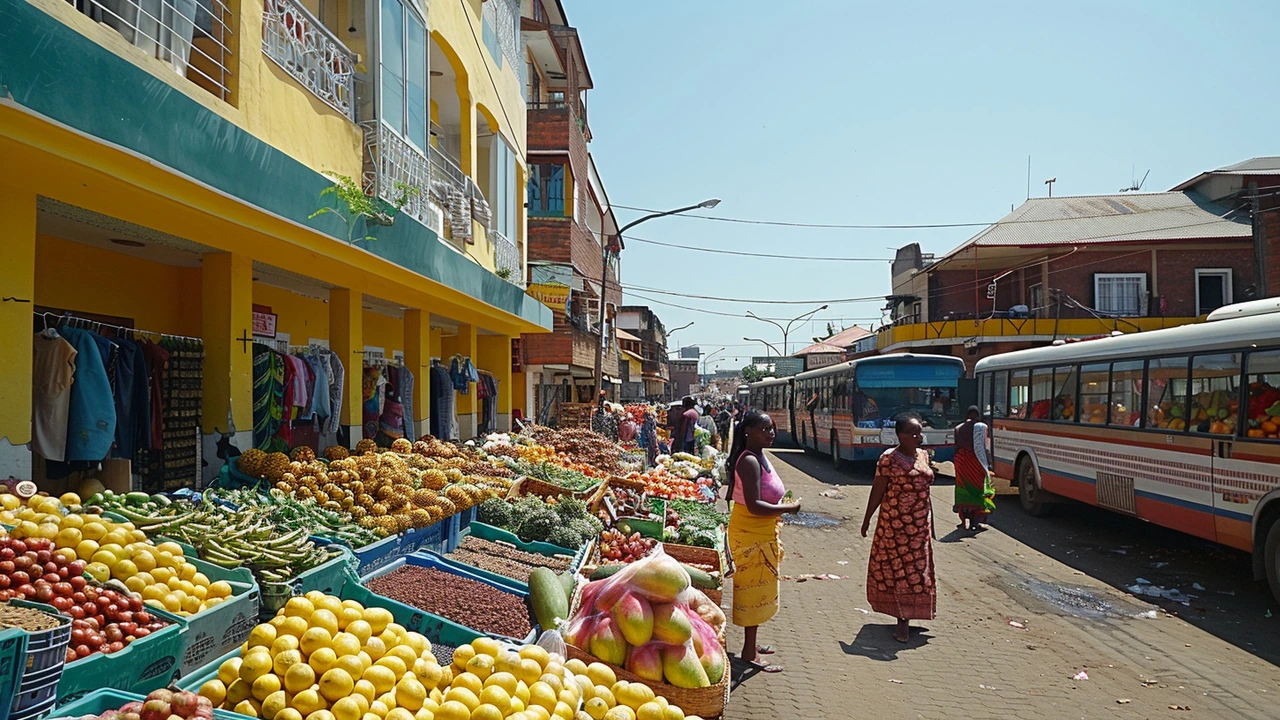
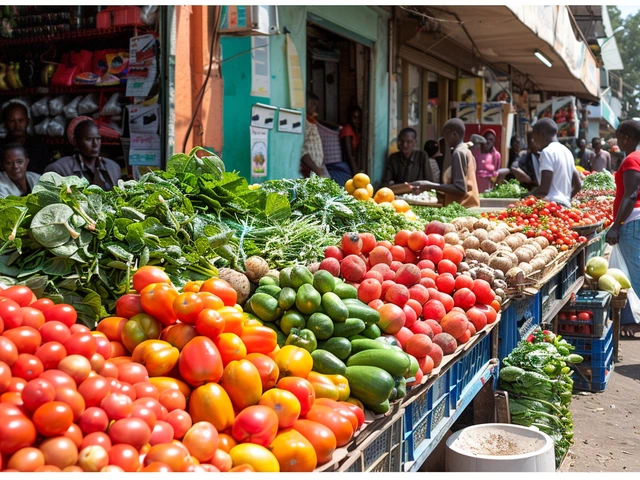 Cost of Living in Ethiopia 2024: Expenses for a Comfortable Lifestyle
Cost of Living in Ethiopia 2024: Expenses for a Comfortable Lifestyle
 Understanding Pharmacist Salaries in Ethiopia: What You Need to Know
Understanding Pharmacist Salaries in Ethiopia: What You Need to Know
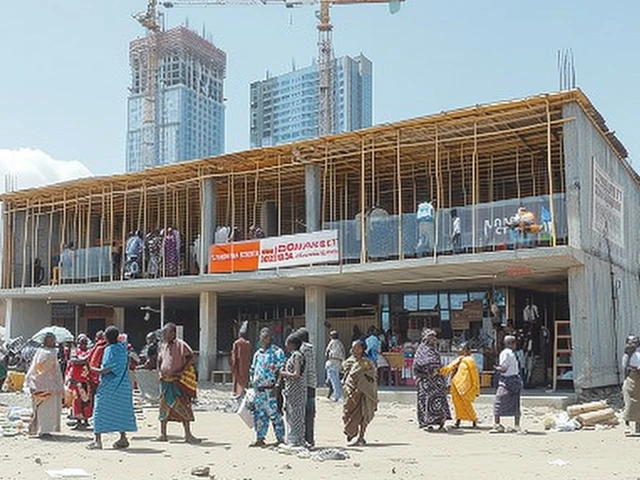 Is Ethiopia the Richest Country in Africa? Exploring Its Economic Potential and Growth
Is Ethiopia the Richest Country in Africa? Exploring Its Economic Potential and Growth
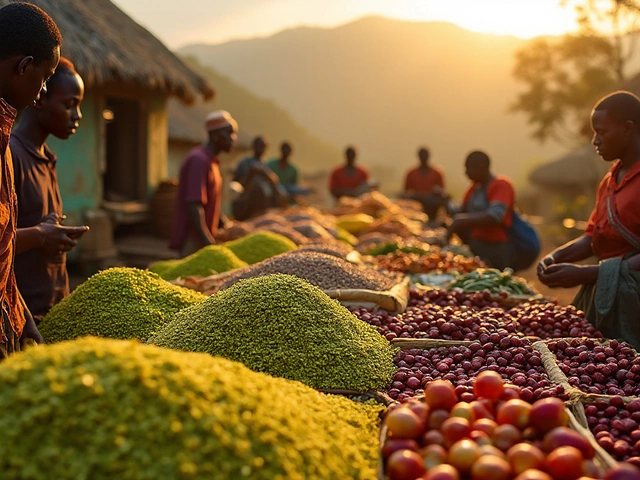 High Demand Opportunities in Ethiopia: Profitable Ventures to Explore
High Demand Opportunities in Ethiopia: Profitable Ventures to Explore
 The 7 Essential Occupations: A Deep Dive into Career Choices
The 7 Essential Occupations: A Deep Dive into Career Choices
Frankie Mobley
June 7, 2024 AT 17:46If you're looking to keep housing costs low, try sharing a place with other expats or locals. Splitting rent and utilities can cut your monthly bill by half or more, and you’ll also get some local insight on the neighborhood.
ashli john
June 11, 2024 AT 20:10That’s a solid tip you’re sharing it’ll help anyone budgeting for life here
Kim Chase
June 15, 2024 AT 22:34yo you can also look for rooms near campus if you’re a student it’s usually cheaper and you get a chance to meet new peeps and learn the culture
David Werner
June 20, 2024 AT 00:58Everyone pretends it’s all sunshine and coffee ceremonies, but the real truth is hidden in the shadows-those hidden fees, the sudden power outages, the unspoken costs that gnaw at your wallet while the city smiles politely.
Paul KEIL
June 24, 2024 AT 03:22When evaluating accommodation, one must consider the amortized depreciation of assets, the opportunity cost of capital allocation, and the macro‑economic inflationary trends that subtly inflate the nominal lease obligation.
Horace Wormely
June 28, 2024 AT 05:46People often overlook the explicit clause regarding utility caps; the lease should explicitly state the maximum payable amount for electricity, water, and internet services to prevent unforeseen expenses.
christine mae cotejo
July 2, 2024 AT 08:10Living in Ethiopia presents a fascinating tapestry of economic nuances that can both exhilarate and bewilder newcomers, especially when it comes to budgeting for day‑to‑day expenses. The first line of defense against financial surprise is a thorough understanding of the local housing market, where rent can swing dramatically between a modest $150 in peripheral districts and a lofty $600 in upscale neighborhoods. Utilities, while generally modest, can still add an unpredictable layer-seasonal variations in electricity usage may push bills from $30 to $80, and water consumption can be similarly erratic. Food costs, though deceptively low for staples like teff flour or locally sourced vegetables, can surge when importing specialty items or adhering to specific dietary restrictions, sometimes tripling the expected budget. Transportation expenses, while nominal for short bus rides, inflate sharply for intercity journeys, with long‑distance bus tickets costing several hundred birr and private taxi rides demanding negotiation skills that can double the advertised fare. Healthcare, an often‐underestimated category, can range from free basic services at public clinics to upwards of $100 for a private specialist consultation, making comprehensive insurance a prudent investment. Entertainment and leisure activities, from museum admissions to hiking excursions in the Simien Mountains, often carry nominal fees, yet the cumulative cost of frequent outings can erode savings if not monitored. Moreover, the cultural expectation of hospitality-sharing meals, attending coffee ceremonies, and participating in communal festivals-while enriching, adds an implicit expense that should be factored into monthly calculations. Seasonal festivals can also affect prices, as demand spikes for accommodation and transport, leading to temporary price surges that catch the unprepared off guard. Currency fluctuations present another hidden variable; the birr’s volatility against the dollar can transform a seemingly stable budget into a moving target overnight. It is essential to maintain a flexible financial plan, allocating a contingency reserve of at least 10‑15 % of total monthly expenses to accommodate these unpredictable shifts. Regularly reviewing bank statements, using budgeting apps tailored to the Ethiopian market, and engaging with local expatriate communities can provide real‑time insights and cost‑saving opportunities. In sum, a disciplined approach that combines diligent research, proactive budgeting, and an adaptive mindset will enable you to thrive financially while immersing yourself in Ethiopia’s rich cultural landscape.
Douglas Gnesda
July 6, 2024 AT 10:34Great summary! Here’s a quick breakdown: rent, utilities, groceries, transport, and health insurance should each occupy roughly 20‑25 % of your net income. Using a spreadsheet to track each category daily can highlight overspending patterns. Also, leverage local market apps for price comparisons-some platforms list weekly specials on teff flour and seasonal produce. Don’t forget to factor in occasional cash‑only transactions, especially at smaller storefronts, as they can affect your card‑based budgeting tools.
Abhijit Pimpale
July 10, 2024 AT 12:58Rent ranges $150‑$600, utilities $30‑$80, groceries $16‑$30, transport $5‑$30, health $20‑$50. Plan accordingly.
Eric DE FONDAUMIERE
July 14, 2024 AT 15:22i think u should also note that local bazaar prices can change daily so keep an eye out for sales and maybe bargain a litte if u feel comfy with the sellers they often lower the price a bit after some friendly chat
Pauline Herrin
July 18, 2024 AT 17:46The financial analysis presented, while thorough, neglects to address the macro‑economic instability inherent in the Ethiopian birr, thereby compromising the reliability of the projected expense models.
pradeep kumar
July 22, 2024 AT 20:10Ignore the macro‑risk; most expats survive on a modest budget without drama.
love monster
July 26, 2024 AT 22:34Great tip!
Christian Barthelt
July 31, 2024 AT 00:58While the article emphasizes affordability, it conveniently omits the hidden costs of expatriate visas, periodic tax obligations, and the volatility of exchange rates that can dramatically inflate living expenses.
Ify Okocha
August 4, 2024 AT 03:22The analysis is overly rosy, failing to acknowledge the systemic corruption that inflates service fees across the board.
William Anderson
August 8, 2024 AT 05:46Everything sounds perfect until you realize the power cuts last for hours, the water pressure drops, and the internet drops like a bad joke-then you’re stuck paying premium for a service that barely works.
Sherri Gassaway
August 12, 2024 AT 08:10One might contemplate the existential implications of budgeting in a land where time is measured not only in minutes but in the cadence of coffee ceremonies and the rhythm of communal sharing.
Milo Cado
August 16, 2024 AT 10:34Indeed, budgeting is a dance of intention and adaptation 🌟. Embrace the flexibility, enjoy the culture, and let the numbers guide you rather than constrain you 😊.
MONA RAMIDI
August 20, 2024 AT 12:58Honestly, that guide is just a bunch of fluff-don’t trust it.
grace riehman
August 24, 2024 AT 15:22i think the article is helpful but could use more info on cheap local transports like the minibus you can hop on and off that cheaply but you realy need to be careful with your stuff